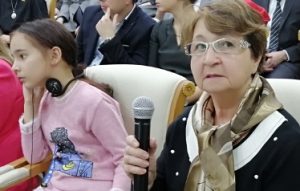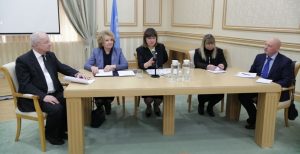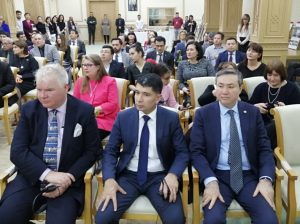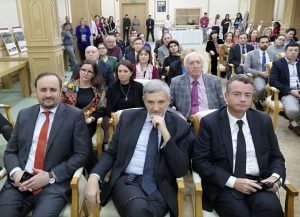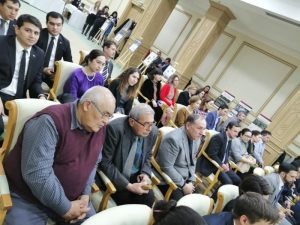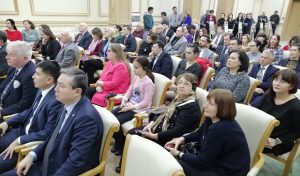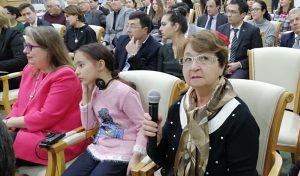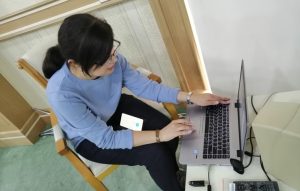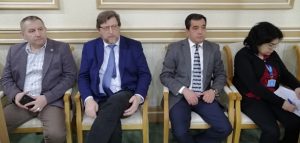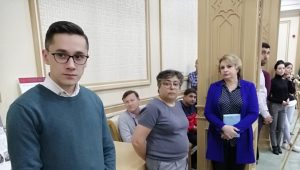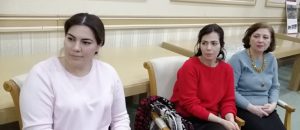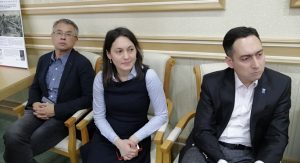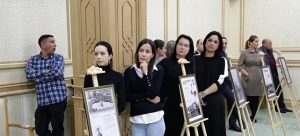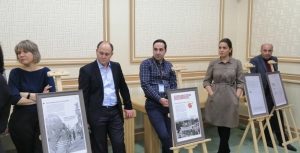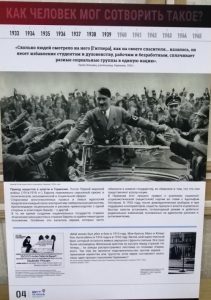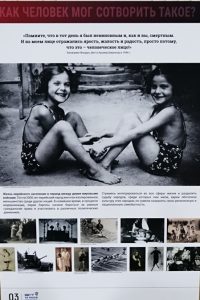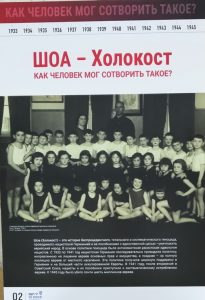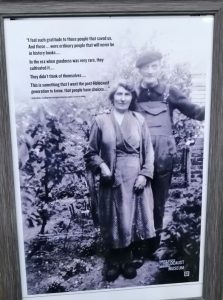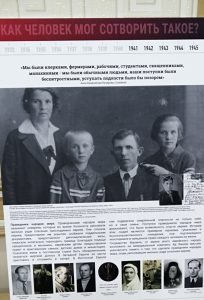nCa Report
Seventy-five years have passed since the day the Soviet troops opened the gates of Auschwitz, ending the Holocaust that had extinguished the lives of six million Jews and eleven million other people.
The UN in Turkmenistan in collaboration with the embassy of Israel organized an event on 27 January 2020 to draw attention to the question whether ‘Never Again’ is an established fact or still a fragile desire.
There were some speeches and there was a photo exhibition ‘Spots of Lights.’
The speeches of Ms. Elena Panova, the UN Resident Coordinator, Ms. Natalia Drozd, the head of OSCE Centre in Ashgabat, and Philipp Saprykin, the deputy head of UNRCCA summed up the hopes and concerns of the world community.
The speeches of Ms. Ayala Meitav, the charge d’affaires of the embassy of Israel, and Ambassador Neithart Höfer-Wissing of Germany were actually the same narrative from two different perspectives.
The speech of Meitav was a calm and measured expression of the need to remain vigilant against the intrusive ideologies that can create the conditions for similar tragedies. She underlined the need for compassion.
The speech of Höfer-Wissing was an act of absolute intellectual honesty and tremendous courage. Every word must be read carefully, more than once.
Ambassador Hugh Philpott of Great Britain, Ambassador Francois Delahousse of France, and Ambassador Diego Ungaro of Italy added their comments to the conversation.
Ms. Nelia Ezriel, a representative of the Jewish community in Turkmenistan told about the sufferings of the war as her father died in the WWII.
* * *
Initially, we were planning to give some excerpts from the speeches of Panova, Drozd, and Saprykin and carry the full text of the statements of Ayala Meitav and Neithart Höfer-Wissing.
However, on reflection, it seems important to give here all the speeches in their entirety. It would be a record of what we were talking here on the 75th anniversary of the end of Holocaust – perhaps a small footnote to the historian.
* * *
Speech of Ms. Ayala Meitav, Charge d’affaires of Israel
Good Afternoon, Shalom, Everybody, Ms. Elena Panova, UN Resident Coordinator, Her Excellency, Ms. Natalia Drozd, Head of OSCE Center, His Excellency, Mr. Neithart Hofer Wissing, Ambassador of the Federal Republic of Germany, Mr. Phillip Saprykin, Deputy Head of the Regional Center for Preventive Diplomacy for Central Asia, Members of the Diplomatic Corp, Teachers and Students of the Institute of International Relations of the MFA, Members of the Ministry of Foreign Affairs of Turkmenistan, friends,
It is my honor to co-sponsor (or co-organize) this thematic exhibition called “The Spots of Light”, here in the UN Building, in this wonderful city Ashgabat.
Special thanks to the UN resident coordinator for hosting and organizing this event.
The theme of this exhibit is the importance of continued action against any form of bias and antisemitism, ensuring human rights for all.
My friends, In a resolution led by the Israeli Foreign Minister Silvan Shalom, the UN General Assembly designated the 27th of January, as the “International Holocaust Remembrance Day”, commemorating the murder of more than 6 million Jews and the deaths of 11 million others, by the Nazi regime. We commend the UN for adopting this resolution.
Only last week, 49 heads of state, including Royals, Presidents and Prime Ministers, gathered in Jerusalem, for one of the most distinguished gatherings ever, marking 75 years since the liberation of Auschwitz by the Red Army. They gathered there not only because of the past, but also because of the challenges of the present.
The Holocaust was unique in the history of mankind, in its systematic murder and cruelty. Two thirds of European Jewry were exterminated.
Yet, even as we stand 75 years after the liberation of Auschwitz, we are sad to state that we are still challenged by Antisemitism on a global rise, and continued forms of hatred and bias against minority groups and selected people. The lessons of the Holocaust are still to be learnt fully.
We have learnt a few lessons from the Holocaust.
We have learnt that threats and acts of hatred must be confronted.
We have learnt that what begins as simple and perhaps little manifestations of hatred, even just words, may later become violent actions.
We have learnt the importance of self-defense.
We have learnt also that what begins as hatred against one sector of society, may spread like a disease to other sectors of society, and therefore we must all stand together, against all forms of hatred aimed at fellow human being.
From the atrocities of the Holocaust was born the statement “Never Again”, which is a dedication to arouse awareness, and stand together against any human acts of hatred and violence.
We say “Never Again” to racism and incitement.
We say “Never Again” to Antisemitism and Islamo-phobia. We say “Never Again” to rape and humiliation
We say “Never Again” to all forms of human bigotry, discrimination and hatred.
We must also remember that in difficult times, some people show great brightness. Some people reveal courage and human solidarity, standing up against hatred and violence, even at great personal risk. They are a ray of light, in a period of darkness. They remind us that there is hope for humanity.
Israel has established recognition of such people, whom we call “Righteous Among the Nations”. Awards are given by Israel to those brave people.
Our prophets already laid forth the vision of world peace. The prophet Isaiah (chapter 2) envisioned a period of time when humanity will “beat their swords into plowshares and their spears into pruning hooks”, when “a nation will not take up a sword against another nation”.
The United Nations, set up in 1945, immediately following the destruction of the Second World War and the Holocaust, was established on the foundation of this prophetic vision. It is based on the values of moral humanism and solidarity. Unfortunately, this period has not materialized yet. We hope and pray for the realization of this prophetic vision.
The challenge is greater than ever.
We still witness many horrors in the world. Minority groups, in many countries, are still persecuted around the globe. The mission of the United Nations is so relevant.
The Jewish people and the State of Israel, are sensitive to such persecutions and human suffering. The past atrocities have taught us to stand up against human persecution.
Israel and the Jewish world have set up an entire mechanism of assistance to others, called “Tikun Olam”, “fixing the world”.
The state of Israel, reestablished out of the ashes of the Holocaust, sends assistance to many countries at their time of need.
Many philanthropic Jews extend great support to needy communities around the world, trying to eradicate poverty and sickness.
This is also part of our lessons from the Holocaust.
Finally, on a personal note, I would like to mention that as a daughter of immigrants from East Europe, I recognize the grace of Central Asian states, including Turkmenistan, who opened their doors and absorbed the Jewish immigrants escaping the atrocities of the Holocaust.
These countries served as a safe haven for my mother, may her memory be blessed, who fled from Lithuania, lived in Central Asia, later immigrated to Israel and set up her new family, out of the ashes of the Holocaust.
Many Jews, like her, were saved by the hospitality of the countries of Central Asia. We will never forget that kind generosity, offered by Turkmenistan and additional countries in Central Asia.
My deep gratitude to all of you for attending this event. I hope you will all join me in the conviction of “Never Again”.
Thank You.
* * *
Speech of Ambassador Neithart Höfer-Wissing of Germany
Dear colleagues from the UN, the OSCE and the Embassy of the State of Israel, Dear colleagues, friends, ladies and gentlemen,
Thank you very much for this opportunity to participate in the International Holocaust Remembrance Day! For me, as the Ambassador of Germany but also for me personally this day is very important.
One of the Soviet soldiers who, 75 years ago, participated in the liberation of the German Concentration Camp Auschwitz, Genri Koptev-Gomolov, was quoted as saying: „I could never understand how a human brain could come up with something like that.” A few months later, when the Second World War had ended, the United Nations had been founded and the Nuremberg Tribunal had started its work, certainly no one believed that there would again be room for antisemitism, as the monstrosity of the nationalsocialist crimes against humanity was so obvious.
And yet, just a few years later, in Genri Nikolaevich’s own state a campaign was started against so-called cosmopolites. They were called “besrodnye cosmopolity”, but it was clear to everybody that this persecution was aimed at Jews.
It was in Germany, my home country where anti-Semitism turned into its most murderous form and led to monstrous crimes against humanity. Even the surrender in 1945, the Nuremberg Tribunal against the so called main criminals and the many facts that became known worldwide right after the war, did not root out anti-Semitism. Already in 1950, a few years before I was borne, Franz Boehm, a German Lawyer and Economist noted in an essay that after but a second of fear, anti-Semites came again out of their holes. People of my generation, shortly after the war, anyway believed for a long time, obviously far too long that anti-Semitism could no longer reemerge and would finally disappear. We simply could or would not believe what already Genri Koptev-Gomolov could not understand: how human beings could come up with something like that after all these monstrosities. And therefore we did not take the signs of reemergence of anti-Semitism sufficiently seriously.
But a few years ago, a political party has emerged in Germany, and is now even the biggest opposition force in our Federal Parliament, large parts of which have a clear tendency towards authoritarian and nazi views. Even in Holocaust Memorials like Buchenwald or Dachau an increasing number of cases is observed when visitors are expressing openly anti-Semitic views. And it does not rest with views: just on 9 October last year in the East German town of Halle only a very solid wooden door saved the lives of 51 persons celebrating Yom Kippur when an extremist tried to massacre them. I felt deeply ashamed to learn that even on this important holiday there was no police protection for the synagogue where they were worshipping.
In other countries anti-Semitism, intolerance and discrimination of “others” are growing as well and becoming more violent. It is obvious that the increasing tendency to follow populists who pray authoritarian ideologies, discrimination and hate crimes coincides with growing anti-democratic sentiments. Authoritarian leaders have a need to discriminate and attack other groups because they need an enemy in order to legitimize their rule. That means in turn that democracy has to be strengthened, and defended. Where democracy is strong, anti-Semitism or the discrimination of others will never become state policy.
In the “Stammlager” in Auschwitz you see a quote by American writer William Saroyan: If you do not want to know history and learn from it you will be condemned to repeat it”.
This implies to end putting pressure on the work of historians but let them do their job. Historians might argue about facts and their interpretation but they should not be forced by laws to disrespect the truth. It is not for governments to decide what people should believe and how they should look at history.
Those countries which continue to critically discuss their own history including its darker pages give an example how important this is in order to strengthen civil society. However, the denial of the Holocaust should be seen in all countries as what it is: hate speech of the worst kind which has nothing to do with serious scientific work. And denials of the Holocaust should be treated accordingly.
It is telling that in some countries the so-called “Protocols of the Elders of Zion” are still used as evidence in court although it was proven already in 1921 that they are a mere anti-Semitic fake of the worst kind. Auschwitz became possible only because of a racist ideology which was based on fake news. And that means in turn that we always have to fight for the truth to be heard.
Just a few days ago the Heads of States and Governments who met in Yad Vashem committed themselves: “A world that remembers the Holocaust. A world without genocide.”
It is certainly not enough to remember the Holocaust on occasions like today’s one and to repeat more or less the same expressions of mourning, of remembrance and of admonition – although all this is also important. One has to find better ways to reach out to those who do not know about the Holocaust, for whom this is something deeply in the past. I can even understand to a certain degree those millennials who told me: “Yes, the Holocaust was a monstrous crime but I was not part of it and I don’t want to be blamed for that all the time.” We have to find new ways to commemorate, and to address problems of discrimination and violent intolerance, in order to immunize coming generations. It is not about creating a feeling of guilt but of responsibility – responsibility to fight discrimination and intolerance, responsibility not to follow populists with “easy and cheap” solutions for everything.
I had hoped that today we have with us students who might give us, from their perspective as a young generation and future specialist of international relations, some impulses how we can do better in fighting anti-Semitism and discriminatory practices.
Let me thank sincerely the organizers of this meeting and of the exhibition “The Spots of Light”.
Thank you for your attention.
* * *
Speech of Ms. Elena Panova, UN Resident Coordinator in Turkmenistan
Dear Colleagues and friends,
2020 marks the 75th anniversary of the liberation of Auschwitz, the ending of the Second World War, and the ending of the Holocaust.
2020 also marks the establishment of the United Nations, formed in response to atrocity crimes of the Holocaust and the Second World War, with the aim of building a world that is just and peaceful.
Let me quote the UN Secretary General “Out of the incalculable horror of the death camps, the world made a new start, founded on mutual respect and our common humanity. Today, as our values come under attack from all sides, we reaffirm them with greater conviction than ever. We will never forget. We will stand firm every day and everywhere against antisemitism, bigotry and hatred of all kinds. We stand united, for human rights and dignity for all”.
This year the theme is “75 years after Auschwitz – Holocaust Education and Remembrance for Global Justice”.
The theme reflects the continued importance, 75 years after the Holocaust, of collective action against antisemitism and other forms of bias to ensure respect for the dignity and human rights of all people everywhere.
Education is a critical part of the solution. Ignorance creates fertile ground for lies and revisionist history. “Never again” means telling the story again and again.
As Holocaust survivors grow older, we must carry their testimony forward from generation to generation. We must also cherish those whose very lives are a rebuke to the forces of hatred and evil. Many survivors live in difficult circumstances; it is incumbent on us all to provide them with dignity and security during their final years.
Today is also an occasion to reiterate the importance of human rights. The Universal Declaration of Human Rights was born from the ashes of the Holocaust in 1948. The 30 rights and freedoms that belong to all of us.
It was created to reaffirm again that all people are equal, that human rights and dignity are fundamental and that we, the people, will never let crimes against humanity happen again.
Seven decades on and the rights included in the Declaration continue to guide and form the basis for international human rights law.
The Holocaust was a turning point in history, which prompted the world to say “never again”.
Dear guests!
Prejudice and hatred thrive on insecurity, frustrated expectations, ignorance and resentment. Populist leaders exploit these feelings to whip up fear, in pursuit of power.
When any group of people is defined as a problem, it becomes easier to commit human rights abuses and to normalize discrimination against them.
Combating prejudice requires leadership at all levels that fosters social cohesion and addresses the root causes of hatred.
It requires investment in all parts of society, so that all can contribute in a spirit of mutual respect.
Promoting social cohesion and human rights, and addressing discrimination and hatred are among the overriding aims of the United Nations, through our efforts to implement the 2030 Agenda for Sustainable Development.
The Decade of Action launched last week is aimed at stepping up support for countries around the world to build inclusive, diverse, respectful societies that provide lives of dignity and opportunity for all.
Dear Colleagues,
The United Nations adopted many resolutions condemning “without reserve” all manifestations of religious intolerance, incitement, harassment or violence against persons or communities based on ethnic origin or religious belief, whenever they occur.
One of them was about designating 27 January — the anniversary of the liberation of the Auschwitz death camp — as an annual International Day of Commemoration in memory of the victims of the Holocaust.
It urged the UN member states to develop educational programmes to instil the memory of the tragedy in future generations to prevent genocide from occurring again.
Remembering, discussing and learning about the Holocaust is important not only because it helps us gain a better understanding of the past, but because it also raises awareness about contemporary forms of antisemitism, xenophobia and other forms of hatred. It illustrates how these can create the preconditions for genocide.
Therefore, through this photo exhibition “Spots of light” we encourage you to explore more fully what the photographs reveal, and this will inform your understanding of the meaning of “Auschwitz”.
Now, let me now invite you to watch the video message by the UN Secretary General.
Remarks on the video:
Dear friends and colleagues,
Now I would like to invite you to watch a short video, the story of Ahmed and Harry, two persons, two lives and 75 years apart. The story of two victims separated from their families, faced the same tragedy. The film was produced by UNICEF.
* * *
Speech of Ms. Natalia Drozd, Head of OSCE Centre in Ashgabat
Dear Colleagues, Dear teachers and students, Ladies and Gentlemen,
Let me thank the Office of the UN Resident Coordinator in Turkmenistan for the opportunity to speak at today’s important event dedicated to the International Holocaust Remembrance Day.
Seventy-five years passed since the liberation of Auschwitz, but it is with terror that we recall today the tragic events of Holocaust, the victims of which were six million Jews. Holocaust has become the outcome of a thousand-year hatred and discrimination against Jews and culminated in what is called anti-Semitism today. It is vital to remind that in their extermination camps, the Nazis and their collaborators also enslaved and killed millions of Slavs, Roma, persons with disabilities, priests, and political activists, which became an evidence of hideous dimensions of hatred and intolerance.
Tragic as it is, nowadays we are witnessing the growth of extremism, xenophobia and racism, which are becoming of great concern in a number of OSCE participating States. Such phenomena creates a serious threat to security and stability in the OSCE region and require urgent decisive responses.
The OSCE participating States first condemned anti-Semitism in 1990. This includes verbal harassment, hate speech and violent attacks targeting Jews and Jewish institutions, as well as neo-Nazi activities and Holocaust denial. Concerned about contemporary manifestations of anti-Semitism, the OSCE participating States committed themselves to undertaking concerted action to address this challenge. They all agreed that enhanced educational efforts and stronger condemnation of anti-Semitism and all forms of intolerance were crucial for the efficient fight against anti-Semitism.
The OSCE Office for Democratic Institutions and Human Rights (ODIHR) is doing a significant work to raise awareness about anti-Semitism and its impact. There is a specialized department in the structure of ODIHR , that directly deals with issues of tolerance and non-discrimination, including countering anti-Semitism and promoting Holocaust remembrance. One of the important tasks of ODIHR is to collect information about, and report on, anti-Semitic incidents and hate crimes across the OSCE region. It should be noted, that ODIHR compiles this data on its Hate Crime Reporting website and closely works with civil society to better record and report on anti-Semitic incidents.
ODIHR is paying special attention to raising awareness on current challenges and effective responses to anti-Semitism by facilitating the exchange of good practices among governments, educators, civil society and Jewish community organizations from the OSCE region for preventing and responding to anti-Semitism.
Indeed, we all know the consequences of hatred, prejudice and anti-Semitism. But this knowledge must be coupled with strong, concrete and comprehensive measures – including security and education.
In an effort to respond to this need, ODIHR launched the project “Turning Words Into Action” with the aim to strengthen the capacity of the OSCE participating States and the civil society to prevent and respond to anti-Semitism. The project started in 2016, under the German OSCE Chairmanship, which has generously provided funding for the three-year period. “Words into Action” brings together members of Jewish, Romani, Muslim, immigrant, and other communities across generations from throughout the OSCE region. Participants engage in educational activities, exchange experiences, and build coalitions for combating anti-Semitism and other forms of intolerance. This OSCE project provides tremendous value. Although it was specifically designed to combat anti-Semitism, it can serve as a model for developing other, complementary programs to address different forms of intolerance.
It is worth mentioning that the OSCE has organized a number of high-level conferences on combating anti-Semitism in the OSCE Region. The Conferences underline the importance of long-term approaches and strategies for combating intolerance and hatred towards Jewish communities and individuals, including through education, social media engagement, and partnerships with civil society networks, local communities, and religious leaders.
Thus, the 2019 conference on combating anti-Semitism organized in Bratislava by the OSCE Slovak Chairmanship emphasized the role of education and reiterated the need for finding new ways to reach young people. Indeed, whatever their nationality or religion, the young people should learn the lessons of history’s greatest tragedy so they not only understand the risks of anti-Semitism, but help us to detect any worrying signs of this horrible phenomenon and other manifestations of intolerance and discrimination.
The OSCE Centre in Ashgabat is paying special attention to the engagement of youth in addressing contemporary issues, primarily countering violent extremism and radicalization that lead to terrorism. In this context, I would like to emphasize the importance of the adoption of the National Strategy of Turkmenistan on the Prevention of Violent Extremism and Countering Terrorism for 2020–2024. The OSCE Centre in Ashgabat is ready to provide any possible support in the implementation of the above-mentioned strategy and preventing violent extremism, the roots of which lie in xenophobia and other forms of intolerance and discrimination.
To acknowledge the 75th anniversary of the Liberation of Auschwitz, the Holocaust and the United Nations Outreach Programme selected the theme “75 years after Auschwitz – Holocaust Education and Remembrance for Global Justice”. The theme stresses once again the key role of education and serves as an evidence of the strong commitment of the international community to taking collective action to prevent anti-Semitism and promote tolerance.
As we commemorate the victims of Holocaust today, I would like to call on students and all young people to spare no efforts in studying and understanding the history of Holocaust and the nature of anti-Semitism. I would also like to encourage those young people who are present today to spread the word and raise the awareness of their peers about this grave issue. Today’s students represent the future generation of diplomats who will take the responsibility for addressing different issues of global importance, including xenophobia, anti-Semitism and racism. Remembering the atrocities of the 20th century, we should do our best to prevent any manifestation of intolerance in the 21st century.
Let us all make our personal contribution to building the future of universal dignity and equality, and in this way, commemorate the victims of Holocaust.
Thank you for your attention.
* * *
Speech of Philipp Saprykin, Deputy Head of the United Nations Regional Center for Preventive Diplomacy for Central Asia (UNRCCA)
Dear Elena, Ayala, Natalia, Dear Ambassadors and members of the Diplomatic corps colleagues, guests,
On behalf of the Special Representative of the UN Secretary-General for Central Asia, Head of the UNRCCA, Natalia Gherman, as I would like to welcome you here in the UN House to pays tribute to the memory of the victims of the Holocaust, to mourn and to remember losses of the incomparable crime against humanity. The Holocaust has left a vivid scar on the history of every country of Europe. Beyond that, the genocide of the Jews is a unique event in the history of humankind.
We are gathered here to also to pay tribute to survivors of Holocaust in many countries of the World who bear witness across seven decades so that others may live in dignity. I would like to thank our dearest partners from the Turkmen Foreign Ministry, the Embassies of Israel and Germany in Ashgabat, our OSCE colleagues, and other partners who helped to organize this important commemoration event.
The 2020 marks the anniversary of the liberation of the Nazi Concentration and Extermination Camp of Auschwitz-Birkenau by Soviet troops on 27 January 1945. It was officially proclaimed International Day of Commemoration in Memory of the Victims of the Holocaust by the United Nations General Assembly.
Besides, 2020 marks the 75th Anniversary of the ending of the Second World War. Acknowledging the milestone year, the Holocaust and the United Nations Outreach Programme has chosen as the theme for Holocaust education and remembrance in 2020, “75 years after Auschwitz – Holocaust Education and Remembrance for Global Justice”. The theme reflects the continued importance, 75 years after the Holocaust, of collective action against antisemitism and other forms of bias to ensure respect for the dignity and human rights of all people everywhere.
2020 also marks the establishment of the United Nations, formed exactly in response to atrocity crimes of the Holocaust and the Second World War, with the aim of building a world that is just and peaceful.
The Holocaust was unprecedented in human history. Hence knowledge of this major element of 20th Century history is needed with a view to preventing the commission of crimes against humanity. The International community has a duty to remember the Holocaust. So, we prevent the History from repeating itself in the future.
Today the United Nations member-states share a collective responsibility for addressing the residual trauma, maintaining effective remembrance policies, caring for historic sites, and promoting education, documentation and research, seven decades after the genocide.
This responsibility entails educating about the causes, consequences and dynamics of such crimes so as to strengthen the resilience of young people against ideologies of hatred. We are about to celebrate the 70th Anniversary of the Convention on the Prevention and Punishment of the Crime of Genocide, and this Convention has never been so relevant.
Today in Ashgabat the remembrance of the Holocaust is passed on through a photo exhibition “Spot of Light”, which is part of our commemoration event, and is a very important contribution to the education process on Holocaust.
As the United Nations Secretary-General, Antonio Guterres says, “after the horrors of the 20th Century, there should be no room for intolerance in the 21st. I guarantee you that as Secretary-General of the United Nations, I will be in the frontline of the battle against anti-Semitism and all other forms of hatred.”
According to him, that is the best way to build a future of dignity and equality for all – and the best way to honor the victims of the Holocaust we will never allow to be forgotten.
Thank you for your attention! /// nCa, 28 January 2020
Here are some pictures from the event:
